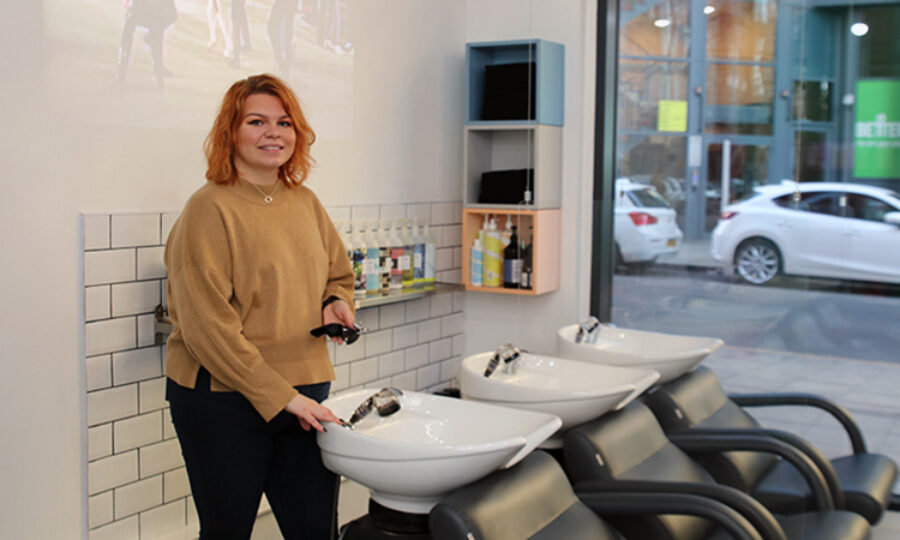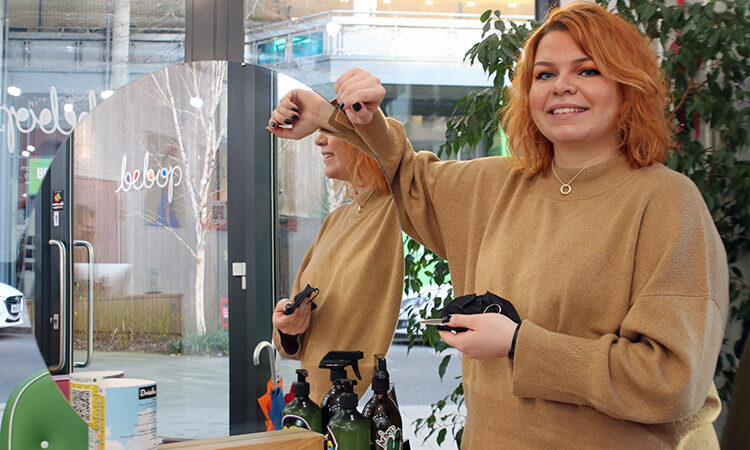Time to talk with D’arcy

Local hairdresser D’arcy on heart-to-hearts with clients, the importance of staff wellbeing and why bebop salon is taking part in Time to Talk Day
Thursday 3 February is Time To Talk Day: a nation-wide push to get people talking more openly about mental health.
Since its launch in 2014, the initiative has helped spark millions of conversations in communities, schools, homes, workplaces, in the media and online. Islington has got some great events going on to help get the conversation going – including at local hairdressers, bebop.
Bebop staff will be starting conversations about mental health and wellbeing with their clients, family, friends, colleagues and neighbours, using Time to Change conversation cards. D’arcy tells us more:
Why is the Time to Change cause, and talking about mental health, important to you and the Bebop team?
Hairdressing is very much a customer-focused job and we at bebop believe in connecting to our clients to help them get the most value from their time in our salon. This makes for a more personal experience, while giving our clients hair that makes them feel confident and great about themselves.
Hairdressing is one of only a handful of jobs where you have to work within someone’s personal space. This can often be uncomfortable, awkward and anxiety-inducing for some people, so we make sure that we are always aware of this and build up a relationship, getting to know our clients personally and creating a safe space. People open up to us about all aspects of their lives, ranging from personal worries and anxieties, to just off-loading the day’s stresses. While it’s lovely that our clients feel they can open up to us, it can be quite emotionally draining, so we need to make sure that we have the right coping mechanisms in place to deal with it. Having a good understanding of mental health and having open conversations with each other and our clients means we are better placed to look after each other.
What role do you think hairdressers and salons like bebop play in supporting people’s mental health and wellbeing?
We have recently seen the toll the pandemic has taken on everyone’s mental health. Every person has been affected by it in some way. It has changed our lives dramatically and we’ve had to adapt. We have seen the role of a hairdresser evolve: we essentially give an impartial ear for people who sometimes have no one to talk to, or don’t feel like they an open up to people closest to them. Hairdressers often witness or hear about important events in peoples’ lives, the good and the bad. We have helped people to feel confident for their big meeting by giving them a haircut and colour that makes them feel like they can take on the world. We have seen clients get married and have children; talked to them about their wedding venues and the cost of prams. We have also seen clients through their worst times and have been there to comfort them.
We have a trained mental health first-aider in the salon and have monthly one-on-ones with each member of the team to help with any issues that occur. We have also developed our own mental health education for hairdressers, which we are currently trying to deliver to salons across the UK, as well as trying to get it onto the hairdressing apprenticeship NVQ. The education involves mental health first aid practises, ways to manage your own wellbeing, as well as navigating client conversations and difficult situations.
At bebop, we have created a safe space for our clients where we can offer support, as well as contact with local mental health charities and organisations should a client need further support once they leave our chair.

What do you do to manage your own wellbeing and mental health?
People in our industry often develop unhealthy coping mechanisms to deal with the emotional and mental toll it takes. It can also be very psychically demanding, as you tend to be on your feet all day, standing in one position, with no break for food. This has caused a lot of people in our profession to turn to alcohol and drugs to help deal with the pressure. We believe that it is important to have a healthy work-life balance. By having open and honest conversations with each other, we can figure out what works best for our team. The fast pace of hairdressing makes you crave the pressure and it’s very rewarding when you get positive feedback from your client, but you need to realise your limits and set boundaries.
Music has played a massive part in managing our team’s mental wellbeing. We are all very passionate and feel connected to music. After all, a lot of trends and subcultures come from music, which often have related hairstyles. The music we play in the salon has the power to dictate the atmosphere and mood in the salon. It’s important for this to feel right, so we curate monthly playlists on our Spotify – just search ‘Bebop’ and you’ll find them. We are the ones with the smiley face logo!
Our team also has free access to a nearby gym and monthly budget for at-home massage therapy. Your psychical health is tied to your overall wellbeing and mental health.
How is Bebop getting involved in Time To Talk Day this year?
We are opening our doors and sparking the conversation within our industry and clients about mental health. We are here to show that there are mindful ways for hairdressers to deal with difficult conversations, as well as making hairdressers aware of the role that they play for their clients and how important they can be for them. We also want to show that there is support out there and you are not alone.
The salon will be providing our regular leaflets and cards with contact information for different mental health issues for our clients, if they wish to take them. We will also be running social media campaigns on Instagram and Facebook @bebopldn, as well as curating a de-stress and feel-good Spotify playlist for when you need that time to yourself.
Time to Time to Talk Day 2022 is run by Islington’s Time to Change Hub, in partnership with Mind and Rethink Mental Illness in England and Co-op.
